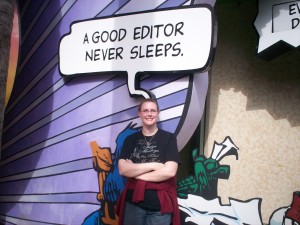 Psychology
Psychology  4 Comments
4 Comments No, I will not answer in the form of a question: Reverb Broads 2011 #13
 Reverb Broads 2011, December 13: What are three things you are better at than most people? (courtesy of Catie at http://catiecake.wordpress.com/)
Reverb Broads 2011, December 13: What are three things you are better at than most people? (courtesy of Catie at http://catiecake.wordpress.com/)
I sure wish any of these three things were people skills. I wish these abilities could be leveraged to make the world a better place. But they’re really not. They don’t even make me particularly likable in many circles.
My first superpower is proofreading. I come by this skill genetically; my mom is the Supreme Goddess of All Secretaries. I’ve been proofreading for her since I was eleven years old. I’m also a grammar nazi, the kind of person Lynne Truss (Eats, Shoots, and Leaves) calls “a stickler.” And I’ve had a lot of fantastic English and journalism teachers who did unusual things, like make me memorize all the articles* in fifth grade.
I see spelling and punctuation errors like Haley Joel Osment sees dead people: They’re everywhere. Moreover, I usually see these mistakes within about three seconds, even on a full page of text. Local TV ads, signs in grocery stores, and small-town papers (even large-town papers, more and more) make me flinch instinctively. There have been books (usually paperbacks are worse than hardcovers, for some reason) that I have been unable to finish without a marking pen in hand; my mom and I have both offered to various romance publishers to proofread for free, just to keep ourselves in trashy novels. And every time I let a publication go out that I haven’t given a pass, I inevitably find a dumb error, which really doesn’t help my general control freak-ness.
But if you ever need to hire an editor for something important, even just a résumé or wedding invitation? I’m your girl, and I work cheap.
My second superpower is quiz shows. I’ve written before about my weird feats of memory; in short, I’ve got a mind like a steel trap for trivia, and a sieve for useful things. And I’ve got a knack for abstract thinking — the more oblique the clue, the better. This combination allows me to be good enough at Jeopardy! that I was regularly kicked out of the lounge in my college dorm when it was on, but to graduate a few hundredths of a grade point shy of wearing honor cords. I can solve Wheel of Fortune puzzles without any letters. I’ve been told by more people than I can count on two hands that I would be their lifeline on Millionaire. I deserve Carl Kasell’s voice on my answering machine. I do, in fact, know Jack.
Finally, my third superpower is reading aloud. Frankly, I rock at this. I’ve got some mutant skills in this area: I can read text I’ve never seen before upside-down at full speed, which would make me the Most Popular Children’s Librarian In The World, if I wanted to be. And when I read aloud, I make it a full-on dramatic event. With me, you get different voices, accents, and a panoply of emotions. If it says, “She screamed,” I can make it sound throat-shredding without even getting that loud. If the character has a head cold, ids goig do sound lig id. Glaswegians sound like Glaswegians; goats sound like goats.
I don’t only do this for my kids and their classes at school. I’ve probably read a dozen books (including every word of Harry Potter) and a thousand articles aloud to my husband. Sometimes, as in the case with the Master Li and Number Ten Ox stories, reading them aloud in their entirety is just more coherent than reading out context-less passages every time I laugh aloud (which is almost every page). And sometimes, it’s because I want to fully convey my shock and outrage. He’s very patient with me, and I’d like to think it’s a value-added service.
In short, I’m a pedantic, overly dramatic know-it-all. But I’m the best one you know.
*a, all, an, any, both, each, every, few, many, more, most, no, several, some, that, the, these, this, those, which, and all number words like one, two.